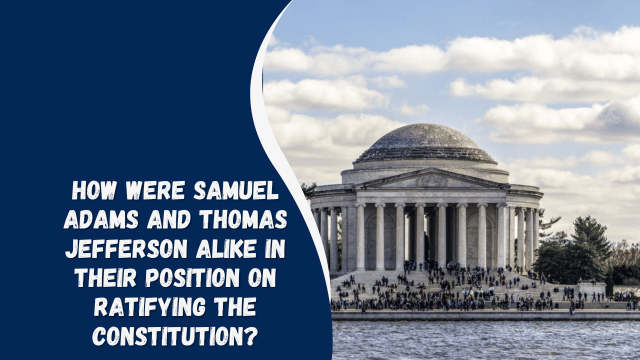How Were Samuel Adams and Thomas Jefferson Alike in Their Position on Ratifying the Constitution?

When delving into the annals of American history, the names of Samuel Adams and Thomas Jefferson shine brightly as pivotal figures. Both men played crucial roles in shaping the nation during its formative years. While they hailed from different regions and held distinct roles, their positions on ratifying the Constitution shared remarkable similarities. This article navigates through the historical landscape to illuminate the parallels between Adams and Jefferson, shedding light on their united stance towards ratification.
How Were Samuel Adams and Thomas Jefferson Alike in Their Position on Ratifying the Constitution?
In this article, we will explore the shared ideologies of Samuel Adams and Thomas Jefferson regarding the ratification of the Constitution. The commonalities between these two influential figures provide insights into the principles that underpinned the birth of the United States of America.
Alike in Their Vision for a Limited Federal Government
Both Adams and Jefferson championed the idea of a limited federal government. They believed that the power of the government should be restrained, ensuring that individual rights and state sovereignty remained intact. This shared viewpoint stemmed from their experiences under British rule, where an overbearing central authority stifled personal freedoms.
Emphasis on Individual Liberties
Adams and Jefferson were ardent advocates of individual liberties and natural rights. Their belief that governments should derive their power from the consent of the governed echoed in both their writings and actions. Adams’ fiery speeches and Jefferson’s eloquent prose consistently highlighted the significance of preserving individual freedoms.
Commitment to States’ Rights
The duo shared a deep commitment to states’ rights. They contended that states should retain authority over matters not explicitly granted to the federal government. This stance was a manifestation of their concern that a strong central government could become tyrannical, as they had witnessed in the past.
Opposition to a Standing Army
Adams and Jefferson were wary of maintaining a large standing army during peacetime. They feared that such military power could be used to suppress domestic dissent and infringe upon citizens’ rights. Their apprehensions were grounded in historical precedents of governments using military might to subjugate their own people.
Skepticism of Central Banking
The two shared a skepticism towards central banking institutions. They believed that such entities concentrated economic power and could potentially be manipulated by those in control. Their concerns about economic inequality drove their apprehension towards centralized financial systems.
A Commitment to Civic Virtue and Participation
Adams and Jefferson both stressed the importance of civic virtue and citizen participation in the governance of the nation. They believed that an informed and engaged citizenry was essential for the success of the democratic experiment they were helping to shape.
The Influence of Enlightenment Ideas
Both Adams and Jefferson were deeply influenced by the Enlightenment philosophy that swept across Europe during their time. They drew inspiration from thinkers like John Locke, whose ideas emphasized individual rights, government by consent, and the social contract. These ideas resonated with their convictions, fueling their determination to establish a government that respected and protected the rights of citizens.
Statesmanship and Leadership
Adams and Jefferson were not just thinkers; they were active leaders who played crucial roles in the shaping of the new nation. Adams was known for his leadership in the Continental Congress, his role in the Committees of Correspondence, and his pivotal contributions to the Revolutionary cause. Similarly, Jefferson’s influence extended from his penning of the Declaration of Independence to his work as a diplomat and his role in the Virginia legislature. Their leadership was founded on a shared commitment to democratic principles.
Challenges and Concerns
Adams and Jefferson were not blind optimists. They recognized the challenges and potential pitfalls of establishing a new form of government. Their experiences under British rule had instilled a healthy skepticism of centralized authority. They were keenly aware of the need to strike a balance between a strong enough government to maintain order and protect rights, and a government restrained enough to prevent abuse of power.
Crafting the Bill of Rights
One of the most significant contributions of Adams and Jefferson’s shared viewpoint was their impact on the addition of the Bill of Rights to the Constitution. While neither attended the Constitutional Convention, their ideals reverberated through the minds of those who did. The insistence on explicitly outlining individual rights in the Bill of Rights was a direct response to their concerns and a testament to their lasting influence.
The Importance of Dialogue
Adams and Jefferson engaged in a lively correspondence that spanned decades. Their letters offer profound insights into their thoughts on governance, society, and human nature. This continuous dialogue allowed them to refine their ideas and perspectives, contributing to the development of their shared positions on ratifying the Constitution.
A Legacy of Ideals
The legacy of Adams and Jefferson endures in the American political landscape. Their unwavering commitment to principles of liberty, limited government, and the protection of individual rights continues to shape the way Americans view their constitution and governance. The Adams-Jefferson legacy serves as a reminder that even in the face of challenges, a shared vision can pave the way for a brighter future.
How Investors Generate Profits From Debt: Exploring Different Strategies
FAQ’s
Q: Did Samuel Adams and Thomas Jefferson have similar backgrounds?
A: Yes, both Adams and Jefferson were well-educated and shared a background in law. They were also prominent figures in colonial and revolutionary activities.
Q: Did Adams and Jefferson ever collaborate directly on matters of governance?
A: While they corresponded extensively, they did not collaborate closely on governance matters due to their different roles and geographical locations.
Q: Were Adams and Jefferson in favor of a strong central government?
A: No, both men were wary of a strong central government and advocated for limited federal powers to protect individual rights and states’ sovereignty.
Q: Did Adams and Jefferson influence the shaping of the Constitution?
A: While they were not directly involved in the Constitutional Convention, their philosophies and writings influenced the thinking of their contemporaries who were involved.
Q: How did Adams and Jefferson’s positions impact the ratification process?
A: Their shared views added weight to the concerns about centralized power, contributing to the demand for a Bill of Rights to protect individual liberties.
Q: What legacy did Adams and Jefferson leave regarding constitutional principles?
A: Their commitment to individual rights, limited government, and states’ sovereignty continues to influence American constitutional interpretation and debates.
Conclusion:
Samuel Adams and Thomas Jefferson, though separated by distance and circumstance, shared a remarkable alignment in their positions on ratifying the Constitution. Their joint dedication to limited federal power, individual rights, and state autonomy laid the groundwork for the principles that have endured throughout American history. The echoes of their ideas still resonate in contemporary discussions about the role of government and the preservation of personal liberties.

